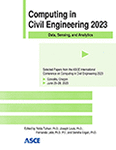Constructability Assessment for Robotics in Construction
Publication: Computing in Civil Engineering 2023
ABSTRACT
Advances in construction robotics represent a potential shift in building design and construction. In general, construction robotics are usually deployed directly onto construction sites without systematically evaluating the design constructability for robotic applications. Literature on constructability suggests that ignoring it during design will cause rework, inefficiency, and higher cost. Although previous studies have widely discussed design constructability, they mainly focus on traditional human craft-based construction methods. Whereas a gap still exists in design constructability assessment for construction robotics. This paper presents an initial analytical framework for constructability assessment for construction robotics during the design phase. Specifically, we summarize factors that impact robotic constructability based on robotic features, design features, work constraints, and piloted an automated constructability checking system for robotics. Additionally, this study takes CANVAS, a drywall finishing robot, as case study to create a framework in simulation environment, and the results demonstrate the potential value of the proposed framework.
Get full access to this article
View all available purchase options and get full access to this chapter.
REFERENCES
Bademosi, F., and R. R. Issa. 2021. “Factors influencing adoption and integration of construction robotics and automation technology in the US.” J. Constr. Eng. Manag., 147 (8): 04021075. American Society of Civil Engineers.
Brosque, C., G. Skeie, and M. Fischer. 2021. “Comparative analysis of manual and robotic concrete drilling for installation hangers.” J. Constr. Eng. Manag., 147 (3): 05021001. American Society of Civil Engineers.
Canvas Construction. 2023. “CANVAS.” Canvas.build. https://www.canvas.build/.
Chang, M.-C., S.-G. Shih, and G. Schmitt. 2017. “Information theory-based approach for constructability assessment in truss structural systems.” Autom. Constr., 82: 84–102. Elsevier.
Follini, C., V. Magnago, K. Freitag, M. Terzer, C. Marcher, M. Riedl, A. Giusti, and D. T. Matt. 2020. “Bim-integrated collaborative robotics for application in building construction and maintenance.” Robotics, 10 (1): 2. MDPI.
Francis, V. E., S. E. Chen, V. M. Mehrtens, A. C. Sidwell, and W. D. McGeorge. 1999. “Constructability strategy for improved project performance.” Archit. Sci. Rev., 42 (2): 133–138. Taylor & Francis.
Hatoum, M. B., and H. Nassereddine. 2020. “Developing a framework for the implementation of robotics in construction enterprises.” EG-ICE 2020 Workshop Intell. Comput. Eng. Proc., 453–462.
Construction Industry Institute. 1986. Constructability: A Primer. Construction Industry Institute.
Jiang, L. 2016. A constructability review ontology to support automated rule checking leveraging building information models. The Pennsylvania State University.
Khatib, M. M. E., and G. Ahmed. 2020. “Robotic pharmacies potential and limitations of artificial intelligence: A case study.” Int. J. Bus. Innov. Res., 23 (3): 298–312. Inderscience Publishers (IEL).
Kumar, V. S. S., I. Prasanthi, and A. Leena. 2008. “Robotics and automation in construction industry.”, 1–9.
O’Connor, J. T., M. A. Larimore, and R. L. Tucker. 1986. “Collecting constructability improvement ideas.” J. Constr. Eng. Manag., 112 (4): 463–475. American Society of Civil Engineers.
Rubenstone, J. 2022. “More Contractors See Benefits of Drywall Finishing Robot | Engineering News-Record.” Accessed May 8, 2023. https://www.enr.com/articles/53423-more-contractors-see-benefits-of-drywall-finishing-robot.
Wang, Z., M. A. H. Khan, Y. Hu, and R. M. Leicht. 2023. “Developing a Work package approach for Construction Robotics.” Proc. 2023 Annu. Conf. Can. Soc. Civ. Eng. Canadian Society for Civil Engineering.
Warszawski, A., and D. A. Sangrey. 1985. “Robotics in Building Construction.” J. Constr. Eng. Manag., 111 (3): 260–280. https://doi.org/10.1061/(ASCE)0733-9364(1985)111:3(260).
Zhang, C., T. Zayed, W. Hijazi, and S. Alkass. 2016. “Quantitative assessment of building constructability using BIM and 4D simulation.” Open J. Civ. Eng., 6 (03): 442. Scientific Research Publishing.
Zhang, J., C. Shen, and R. Li. 2022. “A Robotic System Method and Rebar Construction with Off-the-Shelf Robots.” Comput. Civ. Eng. 2021, 1204–1211.
Information & Authors
Information
Published In
History
Published online: Jan 25, 2024
ASCE Technical Topics:
- Automation and robotics
- Building design
- Case studies
- Constructability
- Construction engineering
- Construction management
- Construction methods
- Construction sites
- Design (by type)
- Engineering fundamentals
- Geotechnical engineering
- Geotechnical investigation
- Methodology (by type)
- Project management
- Research methods (by type)
- Site investigation
- Systems engineering
Authors
Metrics & Citations
Metrics
Citations
Download citation
If you have the appropriate software installed, you can download article citation data to the citation manager of your choice. Simply select your manager software from the list below and click Download.
